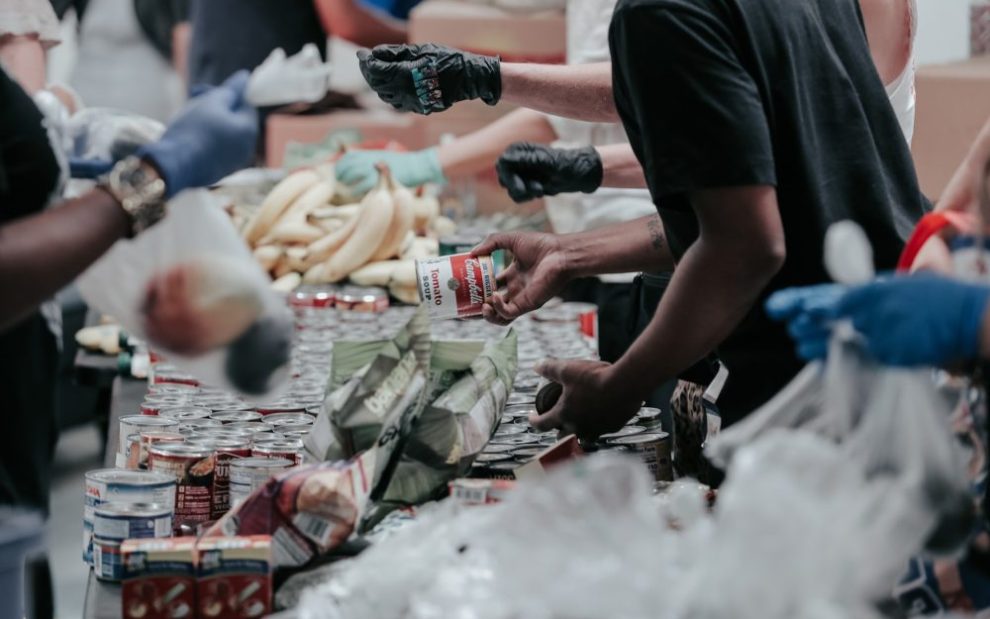Sometimes grace breaks through when you break a pattern or, in workplace parlance, when you “pivot.”
In 2015, the nonprofit I worked for “pivoted” from funding health and education services to focusing on the needs of the “working poor” in our region—people who have full- or part-time jobs and retirees who can’t pay their bills. To best serve them, we spoke with and surveyed hundreds of struggling people. What we learned? Surprisingly, their greatest need was for food.
People earning $25 an hour unable to make a worry-free trip to the grocery store? Seniors who had worked hard living on canned goods? Rents, utility bills, and car payments have skyrocketed in recent years. Given the choice between keeping a roof over your head and buying Cheerios, you’ll go with the former.
So we planned a “more dignified” food pantry in suburbia where people could select fresh food provided by the statewide food bank. The first pantry was held after typical working hours in the parking lot of the state university’s agricultural extension building. It was November, dark, windy, and raining—the type of icy rain that stings your face and chills you to the bone. The turnout was good—too good—a dangerous mix of frazzled parents, rowdy kids, and elderly people unsteady on their feet navigating the wet, grassy parking lot. We narrowly avoided a few fender benders and had one heart-stopping moment when a child dashed toward a moving car.
People got bags of vegetables, fruit, yogurt, and milk—and they were smiling, knowing they’d have a little extra cash that week. But my nerves were beyond frayed. After cleaning up, I gulped down a stiff margarita at the Mexican restaurant across the street before heading home.
The next morning, I had barely settled into my cubicle when my phone rang.
“Thank you,” said a frail, elderly female voice when I picked up.
“You’re welcome,” I said. “What for?”
“Well, I’m looking at the beautiful blue sky after that awful rain yesterday and enjoying a delicious melon I got at your food pantry last night. Do you know I haven’t had fresh fruit for breakfast in years?”
“Oh,” I said, “how lovely of you to call. I hope you can make it again next month.”
“You bet I’ll be there,” she replied.
“Great,” I said. “I hope I get a chance to meet you.” And we hung up.
Knowing I had helped someone get a bite of fresh fruit for breakfast for the first time in years was a bit of a “do-good” dopamine rush. I was instantly hooked. I had worked for nonprofits for years and had helped and been thanked by people before. I knew the gratification of feeding people. But this was a different level of mutual nourishment. A brush with the Holy Spirit from an elderly woman relishing a rare morning bite of melon. I went from dreading the next pantry to thinking about how to improve it.
Over the next months we worked out the kinks and solved our parking problem by moving to a Christian megachurch with a huge parking lot just around the corner. They opened their doors, and their arms, wide. And as the months went by, we got to know the pantry “regulars.” Friendships formed between those serving and those being served.
The visitors were remarkable. Jasmine, a bilingual single mother of three, got up at 3 a.m. to work at Dunkin Donuts so she could spend afternoons shuttling her kids to soccer games. She helped me register Spanish speakers and answer questions about community services. Bright, organized, and down-to-earth, she is one of the most underemployed people I know. When I nudged her toward getting a better job, she’d say, “This schedule works for my kids.” Her kids came first.
Melinda, a home health aide, always brought her client—a developmentally delayed gentleman with whom she was so gentle and respectful that for a long time I assumed he was her brother. I was surprised to see her in the vestibule of my Catholic church one Sunday. She shied away from me; I sensed she was uneasy about being “outed” for accepting free food.
Nancy, in her 70s, at first was too embarrassed to get out of the car and let the neighbor who drove her choose her food. Eventually she was persuaded to come meet us. She became everyone’s offbeat aunt, sporting a hairstyle and thick glasses from the last century, telling us about her cats, former romances, and dead husbands—and sharing pictures of them all.
A group of retired Cambodian refugees in their 80s came every month. Having fled the genocide of the Khmer Rouge in the 1970s, they had worked for years at local technology companies. Knowing their resilience in the face of unspeakable tragedy made us more respectful of all the visitors. We sensed that though their personal history was a shameful part of public history, who was to know what tragic private history any of the visitors might have endured?
By the time the pandemic hit, the statewide food bank had restructured, and my agency ended its cosponsorship of the pantry. The church picked up the ball, feeding more than 350 families every other week in a drive-through operation. I continued to volunteer, but we couldn’t talk directly with the visitors. I missed them. I still do.
Now, when the gospel reading at church is about feeding the poor, I think about Jasmine, Melinda, and Nancy. The most chilling reading is about the rich man who ignores Lazarus, starving and sore ridden, at the gate to his home. His punishment is to suffer eternal torment in the flames of Hades. No slight admonition. The food pantry taught me that today, Lazarus at the gate is as likely to look like the person handing you coffee through the drive-through window as he is to resemble a panhandler huddled in a New York City doorway. I found that Lazarus is often more capable, hardworking, resilient, and multilingual than I am.
The noncanonical epistle of Barnabas says, “I beseech you who are superiors, if you will receive any counsel of my good-will, have among yourselves those to whom you may show kindness: do not forsake them.”
By 2021, I was tired of staring at my computer screen and kitchen walls. I longed for the connection I felt that morning after the first pantry, when the Holy Spirit came to me in the form of the “melon lady.” I started volunteering at another food pantry.
I was there last week, when the truck that rescues food from local grocery stores arrived late and loaded down with strawberries, avocados, and bags of kale. We lined up donated bread products for distribution two boxes deep and 15 feet long. A mom pulled up with two children in the back seat. They turned around to smile and say hi as we put food in the hatch. Placing a loaf of bread, a bag of English muffins, and a stack of bagels in her car, I caught the mom’s eye. She smiled and said thank you. I smiled back and said, “See you next week.” What passed between us felt like a sort of communion—I give her bread, she gives me the bread of life.
This article also appears in the September 2023 issue of U.S. Catholic (Vol. 88, No. 9, pages 20-21). Click here to subscribe to the magazine.
Image: Unsplash/Joel Muniz














Add comment